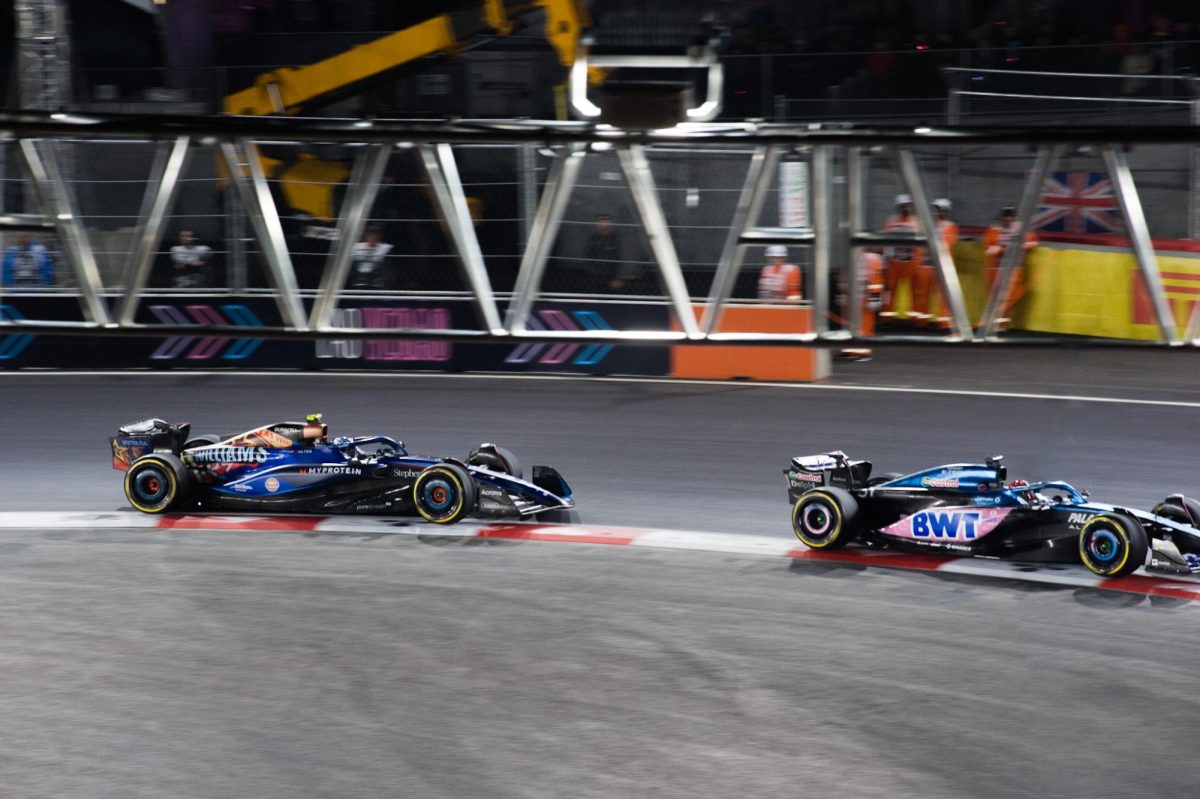On Sunday, Nov. 26, the 2023 Formula 1 season ended with the Abu Dhabi Grand Prix at the Yas Marina Circuit in the United Arab Emirates. Formula 1 is one of the world’s premier open-wheel racing leagues, in which 10 teams compete with two cars and two drivers per team. The competition travels around the globe to different tracks where the races, called Grand Prix, are held. The driver with the most points, earned from their finishing position in the race, is crowned the Drivers’ World Champion at the end of the season, and the team with the most points, earned from the combined finishing position of both cars, is crowned the Constructors’ World Champion.
The finale in Abu Dhabi put an end to a season that saw many longstanding records shattered, a third Drivers’ Championship for Dutch driver Max Verstappen, and a sixth Constructors’ Championship for his team, Red Bull Racing.
The combination of Verstappen and Red Bull’s RB-19 car proved dominant throughout the year. The Dutch driver claimed 19 wins out of the 22 races this season, with his Red Bull teammate Sergio Perez claiming two, bringing the team’s total to 21 wins. The only race Red Bull lost was the Singapore Grand Prix, where Ferrari’s Carlos Sainz became the sole non-Red Bull driver to stand atop the podium.
As a result, Red Bull claimed the record for the most wins by a Constructor in a season, beating Mercedes’ 2016 record of 19.
Verstappen also set individual records with his win tally. He now holds the record for the most wins in a season, beating his own 15-win tally from last year; has the highest win rate in a season at 86.4 percent; broke the record for consecutive wins set by four-time champion and former Red Bull driver, Sebastian Vettel, winning ten races in a row; scored 575 points, the most of any driver during a single season; and became the first driver ever to lead 1,000 laps during the season.
Verstappen was able to wrap up the championship at the Qatar Grand Prix with five races left in the season, which is the joint earliest that a driver has clinched the title. Red Bull was able to secure the Constructors’ Championship a round earlier in Japan.
Across the field, many other teams had an interesting year.
The Mercedes AMG Petronas F1 team had their first winless season since 2011, and seven-time champion Lewis Hamilton notched his second consecutive winless season, prior to which he won a race in every season since joining the sport in 2007. The season was certainly disappointing for the team, who have struggled with their car since last year. Hamilton finished third in the standings at 234 points, and his teammate George Russell finished eighth with 175 points.
“It just didn’t come together,” Mercedes Team Principal Toto Wolff said in an interview with Sky Sports Television, speaking on the underperformance of their car.
Towards the end of the season, Mercedes was locked in a battle for second place with Scuderia Ferrari — a battle which Mercedes narrowly won by three points, 409–406.
Throughout the season, Ferrari lost considerable points to mistakes and issues with the reliability of their cars, with Monegasque driver Charles Leclerc retiring from the opening round in Bahrain, Australia, and the Netherlands. He also was disqualified from the United States Grand Prix in Austin and failed to start the Brazilian Grand Prix. His Spanish teammate Sainz failed to start in Qatar.
“For sure, we gave up more points than our competitors, and that means it is another topic that we need to work on for next year, to be more opportunistic and more efficient,” Ferrari Team Principal Frédéric Vasseur said.
McLaren’s and Aston Martin’s teams had opposite seasons. McLaren started out the season with a car that wasn’t very competitive, scoring just 17 points over the first eight races. The team upgraded the car extensively in the middle of the season and massively improved, finishing fourth in the standings with 302 points. One of their high points came when rookie Australian driver Oscar Piastri won the sprint race in Qatar, which is a shorter version of the full Grand Prix that was held at six of the events in addition to the full race.
Aston Martin began the season strong, with Spaniard Fernando Alonso, a two-time champion, finishing on six podiums in the first eight races. The car then began to struggle through the middle and late season, though Alonso managed to get onto the podium in the Netherlands and Brazil, finishing with fourth in the Drivers’ standings with 206 points while his team finished fifth with 280 points.
For its lineup for this year, French team Alpine featured two French drivers, Estaban Ocon and Pierre Gasly, and the team earned two podium finishes — Ocon in Monaco and Gasly in the Netherlands — but lacked consistency through the year. Gasly and Ocon finished next to each other at 11th with 62 points and 12th at 58 points, respectively, while the team was sixth at 120 points.
In the Williams F1 team, Thai driver Alex Albon handily beat his rookie American teammate Logan Sargeant, out-qualifying Sargeant in every race of the season. Sargeant only scored points once when he finished 10th at the Las Vegas Grand Prix. The team finished in seventh place with 28 points.
Alpha Tauri was forced to change their driver lineup halfway through the season. The team dropped Dutch Nyck De Vries before the Hungarian Grand Prix in favor of Australian Daniel Ricciardo, who returned to the F1 grid after a year off. De Vries’ sacking came after poor performances during the first half of the season. The team finished the season with 25 points, eighth in the standings, with Japanese driver Yuki Tsunoda placing 14th with 17 points and Ricciardo placing 17th with 6 points.
The Alfa Romeo and Hass teams rounded out the table, with 16 points and 12 points, respectively. Alfa Romeo’s drivers Valterri Bottas and Zhou Guanyu finished 15th and 18th, with 10 and 6 points, respectively. Hass’ Nico Hulkenberg and Kevin Magnussen finished 16th and 19th, with nine points and three points each.
The 2024 Season will kick off March 2, 2024, at the Bahrain Grand Prix.












